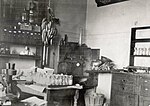Robert A.W. Carleton Strength of Materials Laboratory
Civil engineeringColumbia UniversityLaboratories in the United States
Robert A. W. Carleton Strength of Material Laboratory (Carleton Lab) is a civil engineering materials testing laboratory affiliated with the Department of Civil Engineering and Engineering Mechanics (CEEM) in the Columbia School of Engineering and Applied Science. The laboratory is located on Columbia University's Morningside Heights campus in the City of New York. Carleton Laboratory provides educational facilities for the CEEM Department, supports research of infrastructure and principles of engineering, and conducts specialized testing of materials used in infrastructure in the City of New York and internationally.
Excerpt from the Wikipedia article Robert A.W. Carleton Strength of Materials Laboratory (License: CC BY-SA 3.0, Authors).Robert A.W. Carleton Strength of Materials Laboratory
Low Library Steps, New York Manhattan
Geographical coordinates (GPS) Address Website Nearby Places Show on map
Geographical coordinates (GPS)
| Latitude | Longitude |
|---|---|
| N 40.809441 ° | E -73.959723 ° |
Address
Columbia University (Columbia University in the City of New York)
Low Library Steps
10027 New York, Manhattan
New York, United States
Open on Google Maps



